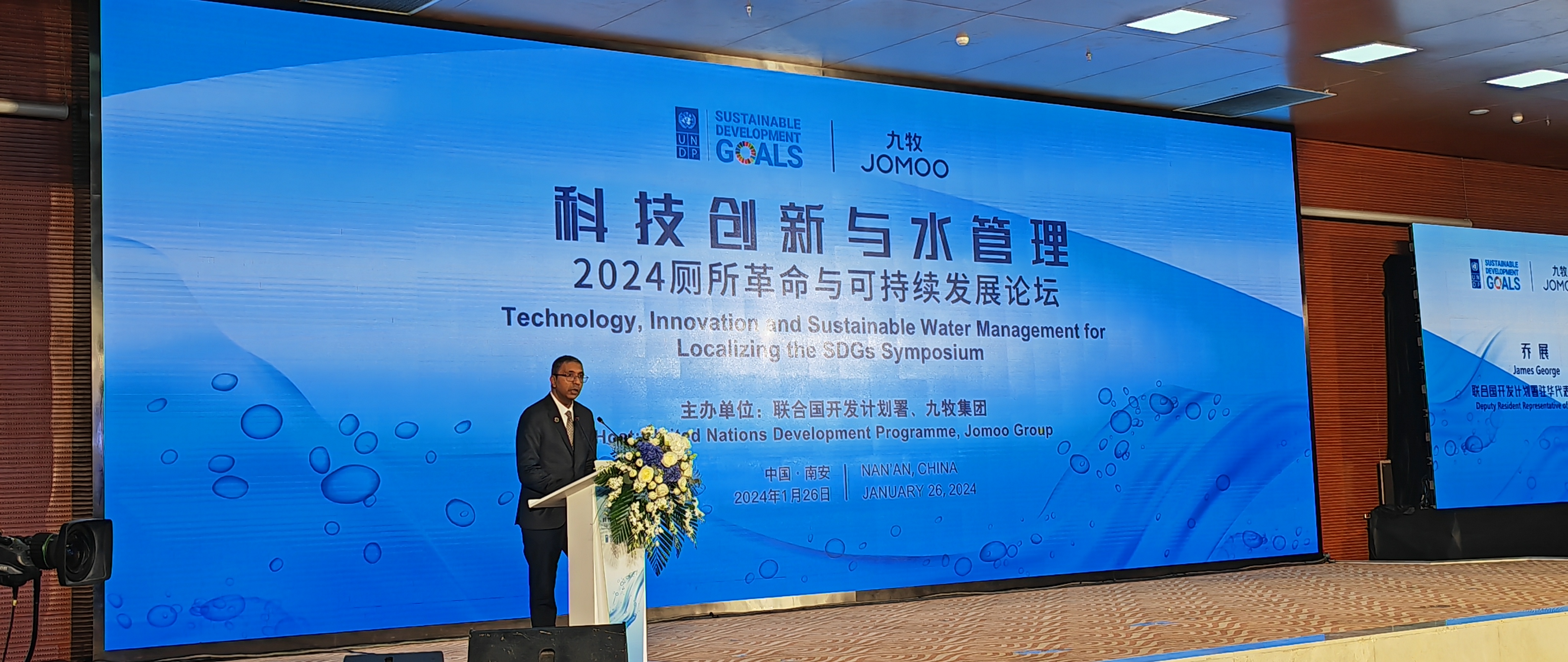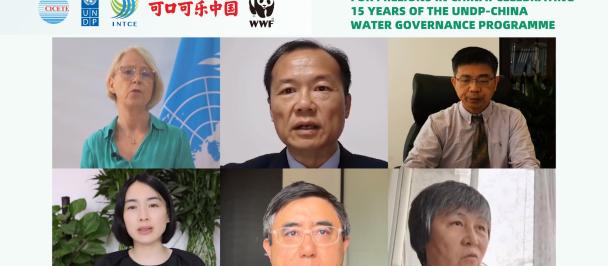Opening Remarks by Mr James George at the Symposium on Technology, Innovation and Sustainable Water Management for Localizing the SDGs
January 26, 2024

UNDP Deputy Resident Representative in China, James George, delivers opening remarks at the Technology, Innovation and Sustainable Water Management for Localizing the SDGs Symposium in Nan’an, Quanzhou City, China.
Ladies and gentlemen,
Distinguished guests,
A very good morning.
On behalf of the United Nations Development Programme in China, it is my honour and pleasure to warmly welcome you to the Symposium on Technology, Innovation and Sustainable Water Management for Localizing the Sustainable Development Goals.
As we gather here in Nan'an, Quanzhou City, the 2030 Agenda for Sustainable Development and the Sustainable Development Goals – our global blueprint adopted by all United Nations Member States in 2015 - to safeguard the future of people and planet – has now passed its mid-point.
However, progress towards realizing the Sustainable Development Goals is woefully behind and requires immediate and critical action – both in terms of speed, scale and resilience.
Only 15% of SDG targets are on track, and over 30% have either stalled or even regressed.
This includes targets for SDG 6 – clean water and sanitation – prerequisites for humans to survive and prosper.
Today, 3.5 billion people live without access to safely managed sanitation, and around 1,000 children under five die every day from diseases caused by unsafe water, sanitation, and hygiene.
Without safely managed, sustainable sanitation, people often have no choice but to use unreliable, inadequate toilets or practice open defecation.
Even where toilets exist, overflows and leaks from pipes and septic systems, and dumping or improper treatment, can mean untreated human waste gets out into the environment and spreads deadly and chronic diseases such as cholera and intestinal worms.
At the core of this agenda is the acknowledgment that sanitation and drinking water are human rights, and access to these services is critical to people’s health and the integrity of the environment.
This situation is most severe in rural areas and developing countries, particularly in low-income communities, where inadequate sanitation conditions pose severe threats to public health and the environment.
With just seven years left, the world has to work, on average, five times faster to meet the sanitation target of SDG 6 – safe toilets and water for all by 2030 – on time.
In March 2023 the world came together during the UN 2023 Water Conference convened by the UN General Assembly.
A main outcome of the Conference was the Water Action Agenda, a collection of new and existing voluntary commitments to take accelerated action on sanitation and water.
The subsequent Blueprint for Acceleration: SDG 6 Synthesis Report on Water and Sanitation 2023, produced by UN-Water and launched at the 2023 High-level Political Forum on Sustainable Development (HLPF), offers actionable policy recommendations directed towards senior decision-makers in Member States, other stakeholders, and the United Nations System to get the world on track to achieve SDG 6 – water and sanitation for all – by 2030.
We need to accelerate our efforts NOW.
"With just seven years left, the world has to work, on average, five times faster to meet the sanitation target of SDG 6 – safe toilets and water for all by 2030 – on time."
Ladies and gentlemen,
Globally, the demand for water is rising due to population growth, urbanization, and increasing needs from various sectors.
And climate change continues to exacerbate these challenges even further, as rising global temperatures accelerate water scarcity.
Overcoming these obstacles will require greater investment in infrastructure, sanitation facilities, and the protection and restoration of water-related ecosystems.
Additionally, improving water-use efficiency is crucial to reduce water stress.
It’s critical to adopt a more integrated and holistic approach to water management, enhance capacity-building, promote innovation and evidence-based action, and strengthen cross-sectoral coordination and cooperation among all stakeholders.
Developing countries require substantial investment in sanitation infrastructure, education, and policy implementation to tackle these pressing needs and improve public health and well-being.
Here in China, the Government has made important strides in addressing rural sanitation challenges through its rural revitalization strategy.
The Three-year Action Plan and the 'Toilet Revolution' have focused on improving toilet facilities, overall environmental sanitation, and waste disposal. China's efforts have resulted in significant progress, with more than 70 percent of rural households now having access to sanitary toilets.
At UNDP China, we have worked for the last four decades to advance development solutions that reduce poverty, promote good health, and protect vulnerable groups alongside our UN sister agencies.
Together with partners, our Clean Water Initiative under our Water Governance Programme, has enhanced access to green basic services to over 220,000 children across 480 schools in China’s western provinces.
The project has provided child-friendly and climate-resilient infrastructure and facilities, such as clean water facilities, rural sewage treatment with Nature-based solutions, and renewable energy generation.
Through our global network, we have also supported sharing these solutions between countries via technical exchanges and dialogues with other developing countries on best practices.
While the progress we have made in advancing sustainable water management is important, it must continue to be built upon.
To do this, contributions from the private sector are absolutely vital. With their capacity for innovation and access to technology and capital, businesses are key to developing sustainable water solutions.
Through partnerships and responsible practices, the private sector can advance equitable access to clean water and sanitation facilities, while also supporting local economies.
As such, I call upon industry leaders to join our efforts and leverage their resources and expertise to help create a future where sustainable water management is a shared priority.
Today’s symposium provides a platform for sharing knowledge and experiences and exploring best practices, case studies, and lessons learned from various countries, including China, on how to harness technology, innovation, and sustainable water management in localizing the SDGs.
To this end, I am thrilled that we are joined by key stakeholders, including international organizations, think tanks, government representatives, NGOs, and Chinese enterprises.
Your presence here reflects a collective commitment to finding innovative ways to accelerate progress towards our goal of clean water and sanitation for all.
In closing, I would like to express my sincere gratitude to our co-host, the Nan'an City Government, for their invaluable support in organizing this symposium. I would also like to extend my appreciation to our event partner, Jomoo Group Co. Ltd., for their contribution.
By working together to localize the SDGs, we can put the world back on track to realizing the vision of the 2030 Agenda, and create a better future for generations to come.
I wish you all productive and enriching discussions ahead.
Thank you!

 Locations
Locations